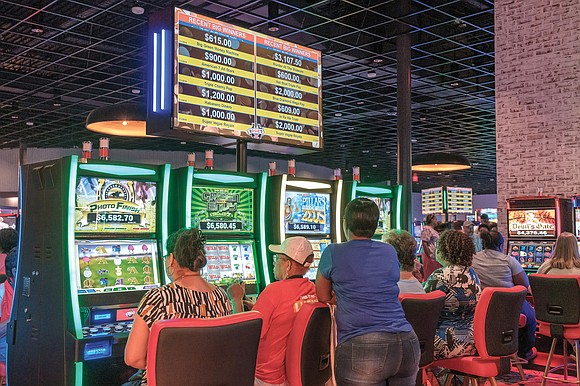And they're off: More than 1,200 race into Rosie's Richmond Gaming Emporium for the first day of betting
Jeremy M. Lazarus | 7/4/2019, 5:58 a.m.

Slot machines are illegal in Virginia.
But don’t tell that to Shannon Bratson, 52, or many of the 1,200 others who piled into the new Rosie’s Richmond Gaming Emporium in South Side Monday morning to try out the 700 new machines following speeches and a ribbon cutting.
“They sure look and operate like slots to me,” said the Richmond waitress, who pointed to the screen and spinning wheels after she punched the button on the penny machine she was playing.
“I should know,” Ms. Bratson continued. “I’m at Charles Town and Maryland Live! several times a month,” referring to Hollywood Casino in Charles Town, W.Va., and the Live! Casino in Hanover, Md.
The slot flavor of the machines is the key reason so many people came to play. The ma- chines are expected to be the top attraction at the new casino-style operation that has taken over the former Kmart store in the 6800 block of Midlothian Turnpike, just as they are in Rosie’s other operations.
Before the doors opened at 11 a.m. at the Richmond site, the line of people waiting to try their luck was four deep and stretched from the speaker’s podium past the side wall to the tree line at this affiliate of the Rosie’s opera- tions in Virginia that include Colonial Downs horseracing track in New Kent County. The track reopened in April.
A smaller Rosie’s gaming outlet is open in Roanoke County and an outlet in Hampton is opening soon.
That initial turnout represented good news for the Chicago investors who have laid out about $41 million to buy and renovate the Richmond property and for the 225 new employees. The new Rosie’s Richmond represents more than 10 percent of the $300 million investment the group is making in facilities.
The turnout also seemed to be good news for the state and city, each of which will capture a share of the revenue the operation generates. Richmond is hoping for $2 million in general revenue from this local site.
Patrons at Rosie’s Richmond found an ex- pansive gaming floor filled with equipment that looks like slot machines.
But looks are deceiving, said David Lermond, executive director of the Virginia Racing Commission, which regulates the machines along with the state’s other horse racing-related operations.
The computer-operated reels in a slot machine are based on random numbers, Mr. Lermond said,
but that is not the case with these machines. The machines in Rosie’s generate winners and losers based on the results of historical horse races, he said. Players, he said, can use buttons to change the horses they bet on or the race that will dictate the results, although most players do not.
Essentially, a group of about 40 machines with the same denomination for play — penny, nickel or quarter — are linked together via a computer. As players put money into the machines, they are actually betting on the outcome of several races on which the winners are known, Mr. Lermond said.
Just as at a track, those bettors whose horses come in first, second or third are the winners, with the big prizes going to people lucky enough to choose the combination of win, place and show in the correct order on the races running behind the scenes.
Most of the time, people are betting on the horses that were the favorites in those already run races, Mr. Lermond said, but they can change the horses they bet on if they choose.
The idea for the slot machine-style racing equipment originated in 2008 at the Oaklawn Racing Casino Resort in Hot Springs, Ark., Mr. Lermond said, and has quickly spread, generating new interest and money for tracks that have seen a decline in interest and attendance at live horse racing.
Every Rosie’s also offers simulcasts of races at tracks around the country that players also can bet on. That will include the 15 days of live racing to take place at Colonial Downs starting Aug. 8.
But that is not what is drawing hundreds of people daily to Rosie’s. And there are winners. Overall, about 93 percent of the money bet is
being returned to players, according to Virginia Racing Commission data. That is a bit higher than Las Vegas and Atlantic City casinos, but not unusual for a slots operation.
Still, the odds of winning a big payout from “historical horse racing” are nearly as high as winning the lottery. In other words, it takes a lot of losers for someone to win.
The money patrons already have spent is eye opening. Rosie’s Colonial Downs histori- cal racing machines generated $58.25 million in May, the VRC reported. There is no data on the number of people who traveled to New Kent to play during May.
The Rosie’s Vinton outlet in Roanoke County brought in another $12.6 million, VRC noted. The monthly gross revenue before the state,
localities and investors took their share was $70.85 million, or 51 percent of total revenue collected from Virginia horseracing bettors be- tween Jan.1 and June 1, according to VRC.
Rosie’s Richmond is expected to generate revenue at least equal to the Colonial Downs operation.
The state receives 0.075 percent of wagers on the slot-like machines. Richmond is to receive one-half of 1 percent of wagers at Rosie’s Richmond plus a share from the New Kent operation.
The owners of the Rosie’s operation received about 5.5 percent of the May wagers, with the rest going back to players.
The purpose of the historical racing is to gen- erate needed cash to support the horse industry in Virginia and maintain live racing.
But such considerations are far from the minds of most of the players, who like Rosie’s owners, are hoping to become big winners.






